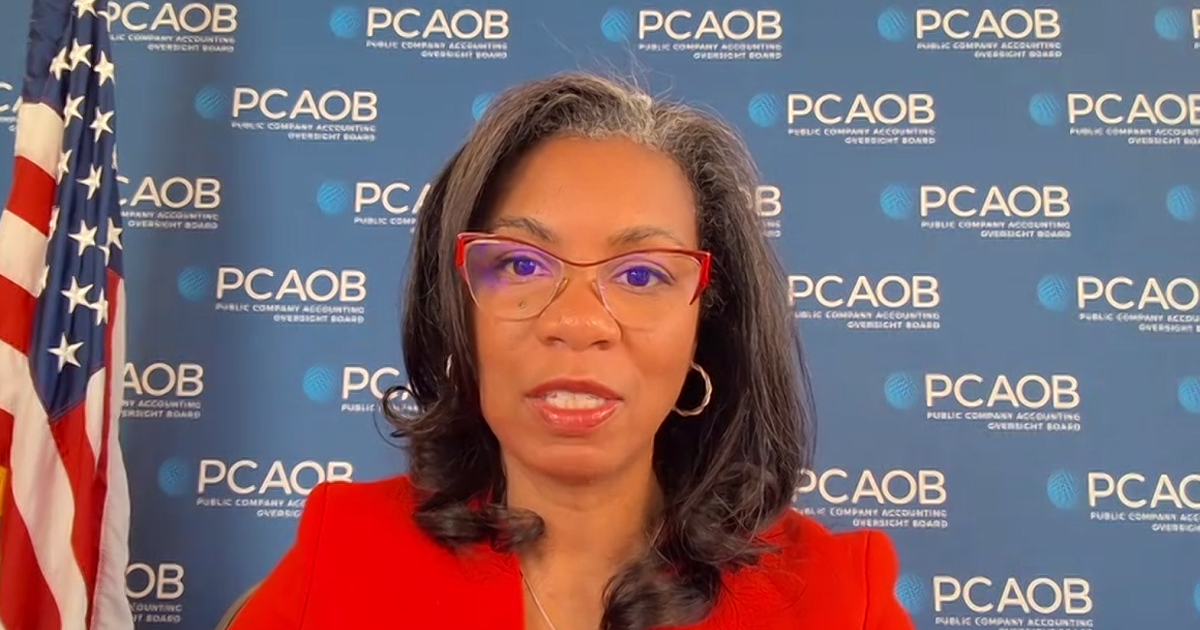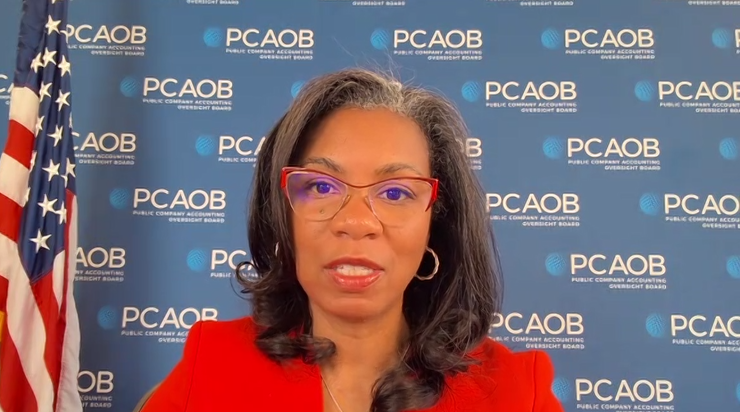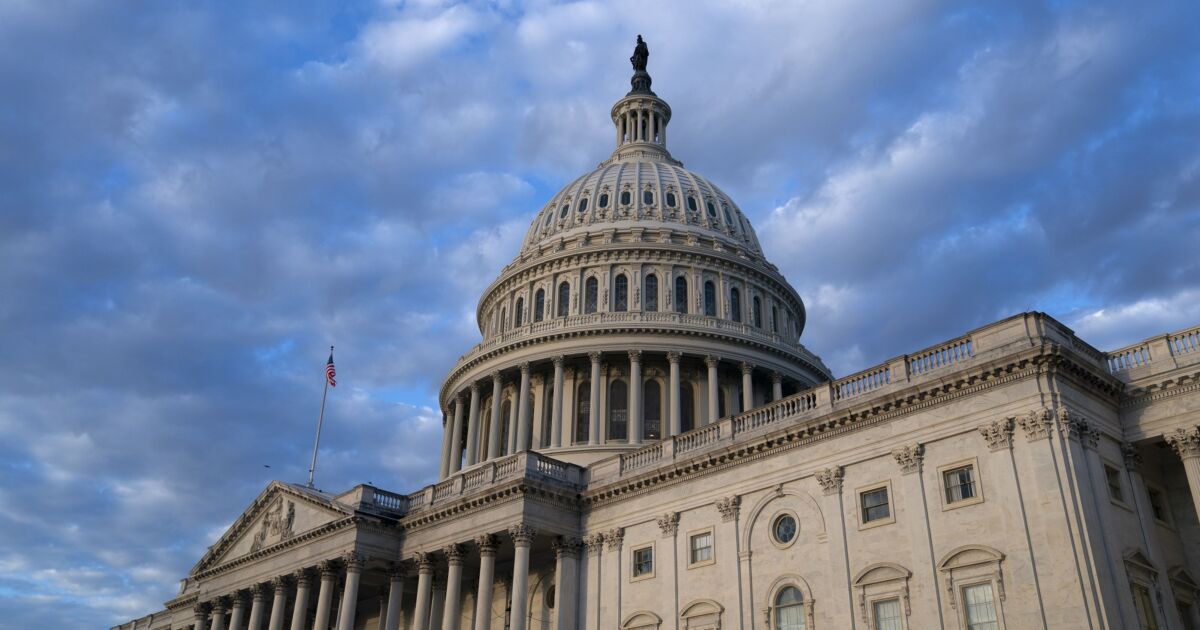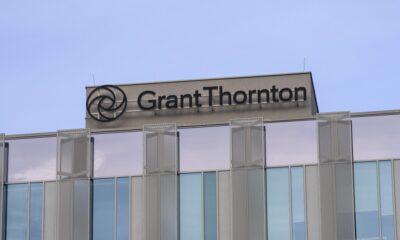Accounting
PCAOB levies $27M in fines for exam cheating and answer sharing against KPMG Netherlands and Deloitte firms in Indonesia and Philippines
Published
1 year agoon

The Public Company Accounting Oversight Board imposed its largest ever penalty of $25 million against KPMG’s firm in the Netherlands, in addition to $2 million in fines against Deloitte’s firms in Indonesia and the Philippines, accusing the firms Wednesday of cheating on exams and sharing answers.
In the KPMG Netherlands case, the PCAOB posted two settled disciplinary orders sanctioning
“The growth and breadth of exam cheating in this case was enabled by the firm’s failure to take appropriate steps to monitor, investigate and identify potential misconduct,” said PCAOB chair Erica Williams during a press conference Wednesday. “Furthermore, during the course of our investigation, the firm submitted and failed to correct multiple inaccurate representations to the PCAOB. For example, the firm claimed to have no knowledge of answer sharing prior to the 2022 whistleblower report. Yet this could not have been true because members of the firm’s management board and supervisory board who signed off on that submission to the PCAOB have in fact cheated themselves. But it doesn’t end there. KPMG Netherlands’ CEO learned the submissions were inaccurate and failed to inform anyone until months later, when a second whistleblower came forward. Only then did the firm correct the inaccurate representations to investigators. This misconduct reveals an inappropriate tone at the top and a complete failure of firm leadership to promote an ethical culture worthy of investors’ trust.”

The sanctions imposed by the PCAOB included a $25 million civil money penalty on KPMG Netherlands — the biggest fine ever levied by the PCAOB — along with a permanent bar and $150,000 civil money penalty on Hogeboom.
KPMG Netherlands acknowledged the problems at the firm and its CEO apologized. The investigation revealed that from at least October 2017, over 500 people at the firm were involved in some form of improper conduct, including sending or receiving answers to training tests and providing or receiving assistance in taking such tests. The firm said the settlement reflects that KPMG Netherlands violated a number of PCAOB rules.
“The conclusions are damning, and the penalty is a reflection of that,” said KPMG Netherlands CEO Stephanie Hottenhuis in a statement. “I deeply regret that this misconduct happened in our firm. Our clients and stakeholders deserve our apologies. They count on our quality and integrity as this is our role in society, with trust as our license to operate.”
The firm said that after the investigation, people, at all levels of seniority, who participated in answer sharing have been sanctioned, and some of them had to leave the firm. After the second whistleblower notification, with regard to a member of the management board, all members of the board of management and supervisory board were subject to additional personal investigations into their involvement in answer sharing. The investigation led to the departure of the former head of assurance as a partner in the firm. The chairman of the supervisory board resigned after admitting he had received assistance in completing a training test.
The PCAOB and the Dutch Authority for the Financial Markets conducted parallel investigations, and the Dutch AFM separately imposed enhanced supervision measures under Dutch law to prevent recurrence of such behavior.
KPMG Netherlands said it has now taken several targeted remedial measures and is working on further improvements in policies and procedures relating to the assessment of mandatory training and internal culture. The remediation process is under the enhanced supervision of the AFM. The supervisory board of KPMG Netherlands will also monitor this closely.
“It is a hard lesson, and we are learning from this,” said Hottenhuis. “We have reviewed our approach to mandatory testing and made meaningful changes to our learning and development programs. We also have implemented controls to monitor whether training tests are being completed appropriately and will continue to do so going forward. We will continuously improve, and we must ensure we do our training sessions appropriately, sustainably.”
KPMG Netherlands also plans to encourage its employees to speak up about improper behavior. “This is a significant failure in our duty to serve the public interest,” said Hottenhuis. “Trust is essential in our business, and we must learn from this and make a change in our culture and behavior. Additional programs on ethical decision making are being rolled out for all teams. This is a critical topic that will remain on the agenda of all leaders and for everyone at our firm.”
The PCAOB said that from 2017 until 2022, hundreds of professionals at KPMG Netherlands engaged in improper answer sharing — either by providing access to test questions or answers, or by receiving such access without reporting it — in connection with tests for mandatory firm training courses. The courses related to different topics, including U.S. auditing standards, professional ethics and independence. The improper answer sharing reached as far as partners and senior firm leaders, including Hogeboom (who at the time was the firm’s head of assurance and a member of the firm’s management board). The growth of this widespread answer sharing was exacerbated by the firm’s failure to take appropriate steps to monitor, investigate and identify the potential misconduct. For example, starting in June 2020, the firm was aware that answer sharing had occurred at a KPMG service delivery center serving KPMG Netherlands and KPMG LLP in the United Kingdom, and the sharing had extended to the U.K. firm’s personnel. Nevertheless, KPMG Netherlands took virtually no steps to investigate potential answer sharing among its employees until a whistleblower reported the misconduct in July 2022.
Without admitting or denying the findings, the firm and Hogeboom agreed to the PCAOB’s respective orders against them. KPMG Netherlands was censured and agreed to pay a $25 million civil money penalty. The firm also agreed to review and improve its quality control policies and procedures to provide reasonable assurance that its personnel act with integrity in connection with internal training, and to report its compliance to the PCAOB. Hogeboom was censured, permanently barred from being an associated person of a registered public accounting firm, and agreed to pay a $150,000 civil money penalty.
Attorneys for Hogenboom and KPMG Netherlands did not immediately respond to requests for comment.
Deloitte Indonesia and Philippines
In the cases involving Deloitte’s member firms in Indonesia and the Philippines, the investigations also uncovered problems with exam cheating and answer sharing on training tests and coverups at high levels of the firms.
The PCAOB announced three settled disciplinary orders sanctioning
From 2017 to 2019, the PCAOB said Deloitte Philippines’s audit partners and other personnel engaged in widespread answer sharing — either by providing answers or using answers — or received answers without reporting such sharing in connection with tests for mandatory firm training courses. On at least six occasions, Baltazar, who was the partner who was supposed to be responsible for e-learning compliance, shared answers to training assessments with other audit partners at the firm. (He has since left the firm.) Attorneys for Baltazar and the firms did not immediately respond to requests for comment.
From 2021 to 2023, over 200 professionals at Deloitte Indonesia engaged in answer sharing. The firm’s failure to detect and deter improper answer sharing by its personnel happened despite numerous warnings from Deloitte Global and regional leadership that answer sharing was impermissible.
Without admitting or denying the findings, Deloitte Indonesia, Deloitte Philippines and Baltazar agreed to the PCAOB’s respective orders against them. Deloitte Indonesia and Deloitte Philippines were censured, and each agreed to pay a $1 million penalty. The firms also agreed to review and improve their quality control policies and procedures to provide reasonable assurance that their personnel act with integrity in connection with internal training, and to report their compliance to the PCAOB.
Baltazar was censured, barred from being an associated person of a registered public accounting firm with a right to apply to terminate his bar after three years, and agreed to pay a $10,000 civil money penalty that reflects his financial resources. The PCAOB said it would have imposed a civil money penalty of $50,000 if it hadn’t considered his financial resources.
“Today’s orders demonstrate that an inadequate tone at the top, particularly with regard to issues of integrity and personnel management, can permeate all levels of a firm,” said Robert Rice, director of the PCAOB’s Division of Enforcement and Investigations, in a statement.
Since 2021, the PCAOB has sanctioned nine registered firms for quality control deficiencies related to the inappropriate sharing of answers on internal training exams.
“I want to be very clear: The PCAOB will not tolerate exam cheating, nor any other unethical behavior period,” said Williams. “Impaired ethics erode trust and threaten the investor confidence our system relies on. The PCAOB will take action to hold firms accountable when they fail to enforce culture, honesty and integrity.”
Accounting Today asked Williams during the press conference whether the
“The goal of those proposals is to provide consistent information about audit firms in their audit engagements to help bolster confidence in our markets and strengthen oversight and empower investors and audit committees as they make informed decisions in order to help drive product quality forward,” Williams responded. “As I noted yesterday, I look forward to reviewing all the input we receive and encourage anyone who’s interested to submit a comment.”
Record levels of enforcement activity
The PCAOB has been cracking down on firms and auditors alike, according to a report released Wednesday by Cornerstone Research.
The
“There was a notable shift in the types of respondents in 2023 auditing actions,” said Jean-Philippe Poissant, who co-authored the report and is co-head of Cornerstone Research’s accounting practice, in a statement. “In the past, two-thirds of respondents were individuals. Yet in 2023, two-thirds of respondents were firms. This shift was the result of a substantial jump in the number of auditing actions that only involved firms.”
The great majority — 79% — of the auditing actions in 2023 included alleged violations of auditing standards. Some 60% of those actions included additional allegations related to ethics and independence standards, quality control standards or both. For the first time, the PCAOB included allegations related to critical audit matters, or CAMs, in enforcement actions, with three actions including such allegations.
Of the $19.7 million in total monetary penalties in 2023, $18.8 million were imposed on firms, nearly twice the $9.5 million imposed on firms in 2022. Some 15% of the firm respondents were required to obtain an independent consultant.
Many of the penalties involve firms outside the U.S., as in the cases today involving Big Four affiliates in the Netherlands, Indonesia and the Philippines.
“More than two-thirds of the PCAOB’s record-setting monetary penalties were imposed on non-U.S. respondents in 2023, even though non-U.S. respondents accounted for less than half of the auditing actions during the year,” said Russell Molter, a principal at Cornerstone Research and report co-author, in a statement.
The number of respondents in auditing actions totaled 53, a 23% increase over 2022, according to the report. The PCAOB settled four actions involving three China-based firms after securing access to inspect and investigate Chinese firms in 2022.
For the second year in a row, there were no enforcement actions related to a company’s disclosure of a material weakness in internal control. In contrast, SEC enforcement actions that referred to an announced restatement and/or material weakness in internal control reached their highest levels in recent years.
Violations of quality control standards were alleged in more than half of the actions involving firm respondents. Nearly 80% of the total monetary penalties in 2023 were assessed on just six defendants. The proportion of individual respondents who were barred increased from 64% in 2022 to 85% in 2023.
Enforcement activity appears to be on course for another record-setting year in 2024.
“This board set a goal to strengthen PCAOB enforcement, and we are doing just that,” said Williams during Wednesday’s press conference. “As of today, the PCAOB has imposed $34 million in penalties this year alone, and it’s only April. We set a record in 2022. We broke that record in 2023, and we are breaking it again today.”
You may like

Your best senior manager just handed in her resignation. Despite competitive compensation, flexible scheduling options, and a clear partnership track, she’s leaving. Her reason? “I need a life outside of work.”
Despite significant investments in retention strategies, accounting firms continue to struggle with keeping top talent. The conventional approach of striving for
The reality is that accounting doesn’t lend itself to consistent equilibrium between work and personal life. Your teams know this. You know this. So why do we keep pursuing a framework that fundamentally conflicts with the nature of accounting?
Accounting continues to face unprecedented challenges. According to the
These challenges create a perfect storm that impacts team well-being. When we’re short-staffed, the burden falls on the remaining team members. When we’re racing against deadlines with complex regulatory changes, stress multiplies. The traditional response has been to simply work harder and longer — a strategy that’s proving increasingly unsustainable.
A perfect work-life balance is a myth. Accounting has natural rhythms and seasonal demands that make equal distribution of time impossible. When we frame the goal as “balance,” we set ourselves up for failure and create unnecessary guilt during intensive work periods.
“Work-life harmony” acknowledges that sometimes work will be the dominant priority, particularly during tax season or major client deadlines. Other times, personal life takes precedence. The key is creating intentional integration rather than forced separation between these aspects of our lives.
One firm I worked with transformed its approach by embracing this concept. Instead of pretending busy season wouldn’t be demanding, they built intentional recovery periods into their annual schedule. They created “no meeting Fridays” during non-peak times and implemented mandatory vacation periods after major deadlines. The result? Improved retention, higher client satisfaction, and increased profitability.
The business case for work-life harmony
When I talk to managing partners about work-life harmony, I often hear: “Sounds nice, but what’s the impact on our bottom line?” This is where the conversation gets interesting.
Through years of working with accounting firms, I’ve consistently seen that prioritizing professional well-being directly improves business performance. This connection between well-being and results is what I call “Fulfillment ROI.”
The research is compelling. Organizations implementing comprehensive wellness approaches see
What might this look like in your firm? Consider the economics of retention alone: Replacing a salaried professional who leaves due to burnout typically
These costs add up quickly, but there’s good news. When professionals learn to implement work-life harmony practices, they become both happier and more effective. In my workshops and leadership programs, the data shows:
- 89% of participants successfully implement time management strategies that enhance both productivity and well-being;
- 93% improve their ability to delegate effectively; and,
- 87% experience measurable reductions in workplace stress and burnout
These individual improvements directly impact your firm’s performance. As people feel more engaged, client service improves and productivity increases. Gallup’s research confirms this connection, showing that highly engaged business units achieve 23% higher profitability while fostering environments where employee well-being is 70% higher than in disengaged units.
The most skeptical managing partners often become the strongest advocates once they see the tangible improvements in both team retention and client satisfaction. When professionals find harmony between their work and personal lives, their energy, creativity, and commitment to clients naturally increase, creating a sustainable competitive advantage for the firm.
Creating harmony in your firm: Practical implementation
Ready to transform your firm’s approach? Here are five approaches that can transform your firm:
1. Implement team coverage models. Replace the outdated expectation of constant individual availability with structured team coverage systems. Consider creating client service teams with primary, secondary and tertiary contacts clearly identified. This approach ensures clients receive consistent support while allowing individual team members to fully disconnect during designated periods. The key is clear communication about how the system works and setting appropriate expectations up front
2. Design intentional seasonal workflows. Map your firm’s natural cycles and build recovery systems directly into your annual planning. Rather than pretending every week looks the same, acknowledge the rhythm of your business. Front-load client preparation during less intense periods, schedule mandatory breaks after major deadlines, and reserve slower periods for professional development and innovation.
3. Establish communication boundaries. Create clear technological guidelines that respect personal time. Try implementing a communication protocol that specifies which channels (email, messaging, phone) should be used for different urgency levels, with corresponding response time expectations. For instance, configure systems to delay non-urgent email delivery outside working hours, or establish “email-free” periods during the day to allow for focused work.
4. Integrate strategic recovery periods. Build brief renewal periods into your daily and weekly rhythms. This might include “deep work” blocks where no meetings or interruptions are permitted, implementing 10-minute breaks between all meetings, or establishing “no-meeting” days during non-peak times. The idea isn’t to work less but to work differently. Strategic pauses increase focus, creativity, and decision-making quality.
Takeaway
The firms gaining a competitive advantage today recognize that professional excellence and personal well-being reinforce each other. They’re creating sustainable high-performance cultures where intensity and recovery work in tandem.
The most successful accounting firms of the next decade will be those that recognize team wellbeing as a strategic advantage rather than a concession. Where will your firm stand?
Accounting
SALT write-off, Harvard tax, Medicaid cuts: What’s in Trump’s bill
Published
2 days agoon
May 23, 2025

House Republicans narrowly
The legislation now heads to the Senate where lawmakers are looking to make their own stamp on the bill. The core of the package — an extension of the president’s 2017 first-term tax cuts — is likely to stay, but the senators could make some changes to a slew of new tax and spending measures that touch many aspects of the economy.
Here’s a rundown of the House bill’s main provisions impacting people and businesses:
$40,000 SALT limit
The limit on
The bill also separately creates a new limit on the value of itemized deductions for those in the top 37% tax bracket that partly erodes the value of the new SALT cap.
Tips, overtime and autos
Tips and overtime pay would be exempt from income tax through 2028, the end of Trump’s second term, fulfilling — at least for four years — his
Medicaid
The bill would accelerate new Medicaid work requirements to December 2026 from 2029 in a gesture to satisfy ultraconservatives who wanted more spending cuts.
The December 2026 deadline would fall just one month after midterm elections, with Democrats eager to criticize Republicans for
Food stamps
The bill aims to save $300 billion by forcing states to pay more into the Supplemental Nutrition Assistance Program. It would also apply work requirements for longer. Beneficiaries must work through age 64, up from 54 under current law.
Interest expensing
Private equity and other heavily indebted business sectors won a major fight in the tax bill on interest expensing. The bill adds depreciation and amortization when determining the tax deductibility of a company’s debt payments. The maximum amount any company can get in such tax write-offs is calculated as a percentage of earnings. That’s why using EBITDA – which is typically bigger than EBIT — in this process would generate heftier tax deductions.
University endowment tax
Some private universities would face a
The provision would create a tiered system of taxation so that colleges and universities that meet a threshold based on the number of students would pay more. Under Trump’s 2017 tax law, some colleges with the most well-funded endowments currently pay a 1.4% tax on their net investment income. The levy would rise to as high as 21% on institutions with the largest endowments based on their student population.
The provision is a major escalation in Trump’s fight with Harvard and other elite colleges and universities, which he has sought to strong-arm into making curriculum and cultural changes that he favors. Harvard, Yale, Stanford, Princeton and MIT would face the
Private foundation tax
Private foundations also would face an
Sports teams
The bill would limit write-offs for professional football, basketball, baseball, hockey and soccer franchises that claim deductions connected to the team’s intangible assets, including copyright, patents or designs.
Electric vehicles
A popular consumer tax credit of up to $7,500 for the purchase of an electric vehicle would be fully eliminated by the end of 2026, and only manufacturers that have sold fewer than 200,000 electric vehicles by the end of this year would be eligible to receive it in 2026. Tax incentives for the purchase of commercial electric vehicles and used electric vehicles would also be repealed.
Renewable tax credits
The legislation would cut hundreds of billions of dollars in spending by
It would also hasten more stringent restrictions that would disqualify any project deemed to benefit China from receiving credits. Those limits, which some analysts have said could render the credits useless for many projects, would kick in next year.
The legislation would also extend through 2031 tax credits for the production of biofuels.
Bonus for elderly
Americans 65 and older who don’t itemize their taxes would get a $4,000 bonus added to their standard deduction through 2028. That benefit would phase out for individuals making more than $75,000 and couples making more than $150,000. It would be retroactive to the beginning of this year.
Trump had campaigned on ending taxes on Social Security benefits, but that proposal would have run afoul of a special procedure Republicans are using to push through the tax-law changes without any Democratic votes. The higher standard deduction is an alternative way of targeting a benefit to the elderly but doesn’t fully offset Social Security taxes paid by many seniors.
Targeting immigrants
Immigrants would face a new 3.5% tax on
Factory incentives
The bill does not include Trump’s call for a lower corporate tax rate for domestic producers. Instead, it allows 100% depreciation for any new “qualified production property,” like a factory, if construction begins during Trump’s term — beginning on Jan. 20 and before Jan. 1, 2029, and becomes operational before 2033. That would be a major incentive for new facilities as Trump
Child tax credit
The maximum child tax credit would rise to $2,500 from $2,000 through 2028 and then drop to $2,000 in subsequent years.
Trump Accounts
The bill would create new tax-exempt investment accounts to benefit children, dubbed Trump Accounts. An earlier version of the bill called them
Pass-through deduction
Owners of pass-through businesses would be allowed to exclude 23% of their business income when calculating their taxes, a 3-percentage-point increase from the current rate. The increase is a win for pass-through firms — partnerships, sole proprietorships and S corporations — which make up the vast majority of businesses in the US.
Research and development
The bill would temporarily reinstate a tax deduction for research and development, a top priority for manufacturers and the tech industry. The deduction will last through the end of 2029.
Oil, gas and coal
The bill would raise billions by mandating the Interior Department hold at least 30 oil and gas lease sales over 15 years in the Gulf of Mexico, which Trump ordered to be renamed to the Gulf of America. It would withdraw Biden-era restrictions on development in Alaska’s Arctic National Wildlife Refuge. The measure would also mandate at least six offshore lease sales in Alaska’s Cook Inlet region over six years. The legislation would also require Interior to offer at least four million acres of coal resources for lease in the West within 90 days of enactment.
Radio spectrum
The legislation would restore the Federal Communications Commission’s ability for the next decade to
New spending
The bill would allocate $150 billion for the military and $175 billion for immigration and border security.
Accounting
Boomer’s Blueprint: Leveraging assets to grow: A guide for firm leaders
Published
2 days agoon
May 23, 2025
Growth in the accounting profession isn’t just about adding more clients or staff; it’s about thinking differently. As market demands shift and technology reshapes our work, firms that want to lead the pack must learn to grow smarter, not just bigger.
One powerful way to do that is to leverage assets. Inspired by the Exponential Organizations model, this strategy allows firms to scale rapidly, control overhead, and expand their impact without increasing what they own. At a time when efficiency and agility are competitive advantages, understanding how to make the most of resources you don’t own could be the difference between stagnation and strategic growth.
What are leveraged assets?
Leveraged assets refer to resources a business uses but doesn’t own. Instead of holding physical or digital assets on its balance sheet, a firm can rent, lease, borrow or access these assets through innovative arrangements. Examples of leveraged assets include:
- Physical assets. Accessing office spaces, IT infrastructure or shared client meeting rooms on demand.
- Digital assets. Cloud-based software for tax preparation, client relationship management systems, or collaborative work platforms like Microsoft Teams or Asana.
Big companies like Uber employ this strategy, building scalable businesses by accessing underutilized physical assets rather than owning them.
Accounting firms traditionally rely on owning resources, from office buildings to proprietary software systems. However, embracing a leveraged model can bring several benefits, including:
1. Cost optimization. By leasing or renting resources, firms can convert fixed costs into variable costs, reducing financial risk and improving cash flow.
2. Scalability. Leveraged assets help firms scale operations quickly to meet demand during busy seasons without long-term commitments.
3. Focus on core competencies. Outsourcing noncore functions like IT infrastructure or HR lets team members concentrate on delivering high-value advisory and consulting services.
4. Flexibility and resilience. Accessing on-demand resources gives firms the agility to adapt to market changes or technological advancements.
Applying leveraged assets in your firm
Here are four ways your firm can reduce costs, improve efficiency, and expand capabilities without increasing ownership.
1. Digital transformation. Start by embracing digital tools that remove the limitations of traditional infrastructure. Migrating to cloud-based accounting platforms like Xero or QuickBooks Online improves accessibility for your team and clients, and eliminates the ongoing costs of server maintenance and upgrades.
Layer in AI-driven tools to automate routine processes like document collections, data aggregation, tax calculations, and client communications. This frees up your team to focus on high-value advisory work.
2. Shared physical resources. Rethinking your physical footprint can also drive efficiency. Rather than investing in permanent office space in every market, consider co-working or shared spaces for occasional client meetings to create a more flexible and cost-effective approach.
Likewise, leasing equipment like high-speed scanners and printers gives you access to the latest technology without the burden of ownership, maintenance or depreciation.
3. Platform ecosystems. Tapping into established software ecosystems allows firms to deliver better service without building everything in-house. Platforms like Intuit ProConnect, Wolters Kluwer and Thomson Reuters offer integrated tools tailored to tax and audit workflows.
Add-on solutions like TaxCaddy and SafeSend enhance the client experience by streamlining document exchange, electronic signatures, and payment collection while keeping your core systems tightly connected.
4. Outsourced expertise. Not every capability needs to live within your four walls. Bring in outside consultants for specialized services like cybersecurity reviews and strategic planning. This lets your firm offer premium expertise without hiring full-time staff. This on-demand access to deep knowledge ensures you stay competitive and relevant, even as client needs evolve.
A leveraged assets strategy
Follow these steps to successfully integrate leveraged assets into your firm.
1. Audit current resources. Identify underutilized assets within the firm and assess opportunities for outsourcing or sharing.
2. Explore digital solutions. Research tools and platforms that align with your firm’s “Massive Transformative Purpose.”
3. Validate the market. Ensure sufficient demand for the services or solutions you plan to scale.
4. Build partnerships. Establish agreements with third-party providers for seamless access to assets.
5. Measure performance. Track the effectiveness of leveraged assets using metrics such as cost savings, client satisfaction, and revenue growth.
Leveraging assets offers several advantages, but it’s important to consider potential downsides. For example, overreliance on gig economy workers for seasonal tax help may impact team culture or service quality. Make sure your growth strategies align with ethical practices and long-term client relationships.
Leveraging assets isn’t just a tactic for tech startups; it’s a transformative strategy your firm can adopt to unlock exponential growth. By strategically accessing physical and digital resources, you can enhance agility, reduce costs, and better serve clients in an increasingly complex financial landscape. The path to becoming an Exponential Organization starts with a single step: rethinking ownership and optimizing leverage.
Think — plan — grow!

MAGA: protecting the homeland from Canadian bookworms

How to pay college tuition bills with your 529 plan

AI drives growth for a few Chinese companies. Analysts share picks

New 2023 K-1 instructions stir the CAMT pot for partnerships and corporations

The Essential Practice of Bank and Credit Card Statement Reconciliation

Are American progressives making themselves sad?
Trending
-

 Economics1 week ago
Economics1 week agoThe low-end consumer is about to feel the pinch as Trump restarts student loan collections
-

 Blog Post1 week ago
Blog Post1 week agoBest Practices to Auditing Your Bookkeeping Records
-

 Economics1 week ago
Economics1 week agoConsumer sentiment falls in May as Americans’ inflation expectations jump after tariffs
-

 Economics1 week ago
Economics1 week agoThe MAGA revolution threatens America’s most innovative place
-

 Accounting1 week ago
Accounting1 week agoGrant Thornton US to add GT Netherlands to platform
-

 Economics4 days ago
Economics4 days agoWhat happens if the Inflation Reduction Act goes away?
-

 Personal Finance3 days ago
Personal Finance3 days agoWhat House Republican ‘big beautiful’ budget bill means for your money
-

 Economics1 week ago
Economics1 week agoThree paths the Supreme Court could take on birthright citizenship
